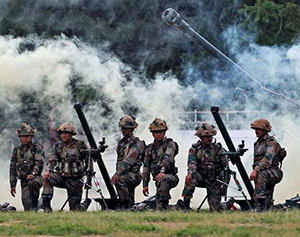Nagpur, Oct 6: Amid a raging debate over the surgical strikes carried out by the Army across the LoC, NCP chief Sharad Pawar, a former Defence Minister, today said there were similar strikes during the UPA regime, but the then government didn't boast about the action.
"There were four surgical strikes (across the LoC) when we (UPA) were in power. However, we did not publicise it," Pawar said here.
Although Pawar congratulated the Modi government over the surgical strikes, he objected to the Army operation being made public. "Some things should not be made public," he said while speaking at a party convention here.
"Our Government carried out surgical strikes in Myanmar, but our operation was limited and we never tried to capitalise on it," he said.
About Modi telling his cabinet colleagues not to create hysteria over the strikes, Pawar said the BJP leaders should avoid making statements (over the Army operation).
"There is no need to make such statements," he said.
Also Read: Modi hiding behind the blood of jawans; exploiting their sacrifice'




Comments
UPA does it for national...NDA does it for publicity...thts d difference
I find it strange and feel sad when people celebrate death of another person..where's humanity Indians?!!! A country led by Gandhi once..and now?? And why does our pm give a damn about pak occupied Kashmir now? ISN'T IT HIS OWN MILITARY THAT IS USING PELLET GUNS OVER young children in Kashmir AND RUINING THEIR LIFE FOREVER???? HE'S DIVERTING ATTENTION! AH! YOU THINK WE WON'T COME TO KNOW? Because KASHMIR ISSUE GOT WORLD'S ATTENTION out PM diverted the issue! GIVE THE PROOF FOR YOUR SURGICAL ATTACK! How ashamed I am to belong to this country since 2014!
Add new comment